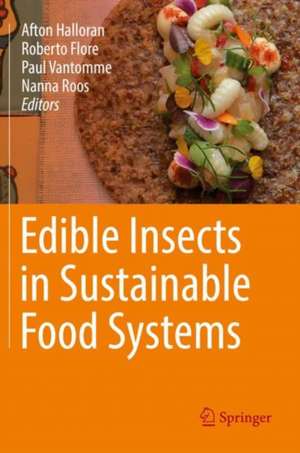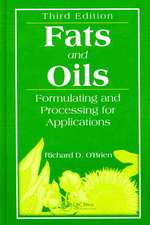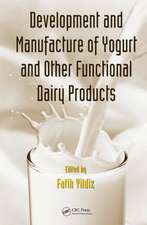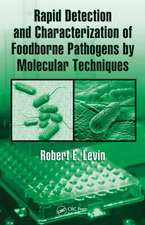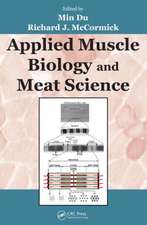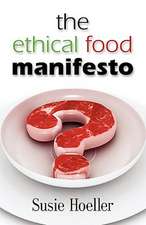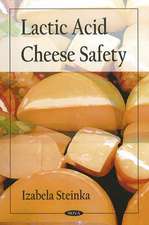Edible Insects in Sustainable Food Systems
Editat de Afton Halloran, Roberto Flore, Paul Vantomme, Nanna Roosen Limba Engleză Hardback – 25 mai 2018
Edible insects in Sustainable Food Systems comprehensively covers the basic principles of entomology and population dynamics; edible insects and culture; nutrition and health; gastronomy; insects as animal feed; factors influencing preferences and acceptability of insects; environmental impacts and conservation; considerations for insect farming and policy and legislation. The book contains practical information for researchers, NGOs and international organizations, decision-makers, entrepreneurs and students.
| Toate formatele și edițiile | Preț | Express |
|---|---|---|
| Paperback (1) | 1827.69 lei 43-57 zile | |
| Springer International Publishing – 2 feb 2019 | 1827.69 lei 43-57 zile | |
| Hardback (1) | 1832.95 lei 43-57 zile | |
| Springer International Publishing – 25 mai 2018 | 1832.95 lei 43-57 zile |
Preț: 1832.95 lei
Preț vechi: 2235.31 lei
-18% Nou
Puncte Express: 2749
Preț estimativ în valută:
350.78€ • 364.87$ • 289.59£
350.78€ • 364.87$ • 289.59£
Carte tipărită la comandă
Livrare economică 14-28 aprilie
Preluare comenzi: 021 569.72.76
Specificații
ISBN-13: 9783319740102
ISBN-10: 3319740105
Pagini: 459
Ilustrații: XVII, 479 p. 80 illus., 64 illus. in color.
Dimensiuni: 155 x 235 mm
Greutate: 0.91 kg
Ediția:1st ed. 2018
Editura: Springer International Publishing
Colecția Springer
Locul publicării:Cham, Switzerland
ISBN-10: 3319740105
Pagini: 459
Ilustrații: XVII, 479 p. 80 illus., 64 illus. in color.
Dimensiuni: 155 x 235 mm
Greutate: 0.91 kg
Ediția:1st ed. 2018
Editura: Springer International Publishing
Colecția Springer
Locul publicării:Cham, Switzerland
Cuprins
Foreword – the contribution of edible insects to sustainable food systems
Basic principles of entomology and population dynamics
Edible insects and culture
Role of edible insects in Asian cultures
Cultural significance of edible insects in Latin America
The contribution of farmed crickets and to rural livelihoods in Asia and Africa
The Importance of Insects in Australian Aboriginal Society
Edible insects in African cultures
Edible insects in North American culture
Nutrition and Health
Insects and human nutrition
Edible insects and food safety concerns
The role of Insects in diets and nutrition in East Africa
Insect consumption in Laos Gastronomy
Gastonomic outlook for insects
Insects in African Gastronomy
Should using insects be considered avant-garde?
Escamoles in Mexican Gastronomy
Foraging and ants in Danish gastronomy
Insects as Animal Feed
Introduction
Insect species in aquaculture and poultry feed in Africa: potentials and constraints
Insects in aquaculture feeds in Norway
Commercializing insect transformation of organic wastes to benefit farmers in Europe
Use of municipal waste as a medium for BSF in Canada
Production of mealworms for conversion of waste to animal feed
Insects as a novel source of animal feed in Europe
Consumer preferences and acceptability
Acceptance of edible insects in Europe
Willingness to pay for edible insects in Kenya
Culture and impact on preferences
Determinants of willingness to eat insects in the USA and India
Acceptance of insects as animal feed and its determinants among farmers
Environmental impacts and conservation
Factors influencing the environmental sustainability of farmed insect species
LCA of insects in aquaculture feeds
LCA of insects as animal feed
Conservation of edible insect species in Southern Africa
Future challenges for insect farming
Possible diseases in farmed insects
Ethical considerations for farmed insect species
Legislation and policy on the use of insects as food and feed
Global status and way forward
The edible insect sector in Europe
Good Agricultural Practices (GAP) in Thailand
Insects in policy and legislation in East Africa
Governing insects as food and feed in North America
Conclusion
Basic principles of entomology and population dynamics
Edible insects and culture
Role of edible insects in Asian cultures
Cultural significance of edible insects in Latin America
The contribution of farmed crickets and to rural livelihoods in Asia and Africa
The Importance of Insects in Australian Aboriginal Society
Edible insects in African cultures
Edible insects in North American culture
Nutrition and Health
Insects and human nutrition
Edible insects and food safety concerns
The role of Insects in diets and nutrition in East Africa
Insect consumption in Laos Gastronomy
Gastonomic outlook for insects
Insects in African Gastronomy
Should using insects be considered avant-garde?
Escamoles in Mexican Gastronomy
Foraging and ants in Danish gastronomy
Insects as Animal Feed
Introduction
Insect species in aquaculture and poultry feed in Africa: potentials and constraints
Insects in aquaculture feeds in Norway
Commercializing insect transformation of organic wastes to benefit farmers in Europe
Use of municipal waste as a medium for BSF in Canada
Production of mealworms for conversion of waste to animal feed
Insects as a novel source of animal feed in Europe
Consumer preferences and acceptability
Acceptance of edible insects in Europe
Willingness to pay for edible insects in Kenya
Culture and impact on preferences
Determinants of willingness to eat insects in the USA and India
Acceptance of insects as animal feed and its determinants among farmers
Environmental impacts and conservation
Factors influencing the environmental sustainability of farmed insect species
LCA of insects in aquaculture feeds
LCA of insects as animal feed
Conservation of edible insect species in Southern Africa
Future challenges for insect farming
Possible diseases in farmed insects
Ethical considerations for farmed insect species
Legislation and policy on the use of insects as food and feed
Global status and way forward
The edible insect sector in Europe
Good Agricultural Practices (GAP) in Thailand
Insects in policy and legislation in East Africa
Governing insects as food and feed in North America
Conclusion
Recenzii
“This book is a valuable and timely addition to the previous books on the topic of insects as food and feed, and is interesting for the professionals in the field of food and feed science, students, human and animal nutritionists and entrepreneurs.” (S. Smetana, Journal of Insects as Food and Feed, September 21, 2018)
Notă biografică
Dr. Afton Halloran completed her PhD on cricket farming in Thailand and Kenya in August 2017 under the GREEiNSECT research project at the University of Copenhagen. She formally worked for the Insects as Food and Feed Programme at the Food and Agriculture Organization of the United Nations, where she co-authored Edible insects: future prospects for food and feed security.
Roberto Flore is the Head of Research and Development at the Nordic Food Lab, University of Copenhagen. Roberto is one of the authors of On eating insects: essays, stories and recipes, a Phaidon Press publication. He is also one of the protaganists in the 2016 documentary BUGS.
Paul Vantomme is a retired Senior Forestry Officer at the Food and Agriculture Organization of the United Nations (FAO). Paul is responsible for initaiting the Insects for Food and Feed Programme at the FAO. He is also a co-author on the publication, Edible insects: future prospects for food and feed security. Dr. Nanna Roos is an Associate Professor in Human Nutrition at the Department of Nutrition, Exercise and Sports, University of Copenhagen. She has extensive experience in research and research capacity in the linkages between human nutrition and insects. She is the principal investigator of the GREEiNSECT research project.
Roberto Flore is the Head of Research and Development at the Nordic Food Lab, University of Copenhagen. Roberto is one of the authors of On eating insects: essays, stories and recipes, a Phaidon Press publication. He is also one of the protaganists in the 2016 documentary BUGS.
Paul Vantomme is a retired Senior Forestry Officer at the Food and Agriculture Organization of the United Nations (FAO). Paul is responsible for initaiting the Insects for Food and Feed Programme at the FAO. He is also a co-author on the publication, Edible insects: future prospects for food and feed security. Dr. Nanna Roos is an Associate Professor in Human Nutrition at the Department of Nutrition, Exercise and Sports, University of Copenhagen. She has extensive experience in research and research capacity in the linkages between human nutrition and insects. She is the principal investigator of the GREEiNSECT research project.
Textul de pe ultima copertă
This text provides an important overview of the contributions of edible insects to ecological sustainability, livelihoods, nutrition and health, food culture and food systems around the world. While insect farming for both food and feed is rapidly increasing in popularity around the world, the role that wild insect species have played in the lives and societies of millions of people worldwide cannot be ignored. In order to represent this diversity, this work draws upon research conducted in a wide range of geographical locations and features a variety of different insect species.
Edible insects in Sustainable Food Systems comprehensively covers the basic principles of entomology and population dynamics; edible insects and culture; nutrition and health; gastronomy; insects as animal feed; factors influencing preferences and acceptability of insects; environmental impacts and conservation; considerations for insect farming and policy and legislation. The book contains practical information for researchers, NGOs and international organizations, decision-makers, entrepreneurs and students.
Edible insects in Sustainable Food Systems comprehensively covers the basic principles of entomology and population dynamics; edible insects and culture; nutrition and health; gastronomy; insects as animal feed; factors influencing preferences and acceptability of insects; environmental impacts and conservation; considerations for insect farming and policy and legislation. The book contains practical information for researchers, NGOs and international organizations, decision-makers, entrepreneurs and students.
Caracteristici
Takes a multi-disciplinary approach to analyzing how insects contribute to food systems around the world
Includes unique research on edible insects from Asia, Europe, North America and Africa
Features state-of-the-art research on farmed, semi-cultivated and wild insect species
Includes unique research on edible insects from Asia, Europe, North America and Africa
Features state-of-the-art research on farmed, semi-cultivated and wild insect species
